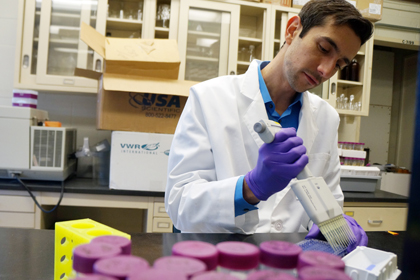Think of the immune system as the shepherd, and bacteria as the sheep, says Dimitry Krementsov, Ph.D., assistant professor of medicine in the Division of Immunobiology at the Larner College of Medicine at the University of Vermont.

Dimitry Krementsov, Ph.D. (Photo: LCOM Creative Services)
Think of the immune system as the shepherd, and bacteria as the sheep, says Dimitry Krementsov, Ph.D., assistant professor of medicine in the Division of Immunobiology at the Larner College of Medicine at the University of Vermont. Since it’s “constantly monitoring,” the immune system is the authority on what in the body could be harmful or benign, including the millions upon millions of bacteria that live in the gut.
This has important implications for Krementsov’s research on multiple sclerosis (MS), a disease in which an abnormal response of the immune system attacks the covering around nerve fibers and disrupts brain-to-body communication, often leading to chronic pain, weakness, and severe fatigue. In addition, MS has a connection with the gut: the gut microbiome is different in patients with MS in comparison to healthy peers. What is unclear is whether this plays a part in causing the disease, or is a product of the disease itself. Krementsov is tackling that question by looking at how a person’s genes shape the gut microbiome.
“How does the host genome impact what bacteria live in the gut? How are they ‘talking?’” he asks. His work could have implications for a suite of autoimmune disorders, including rheumatoid arthritis and lupus.